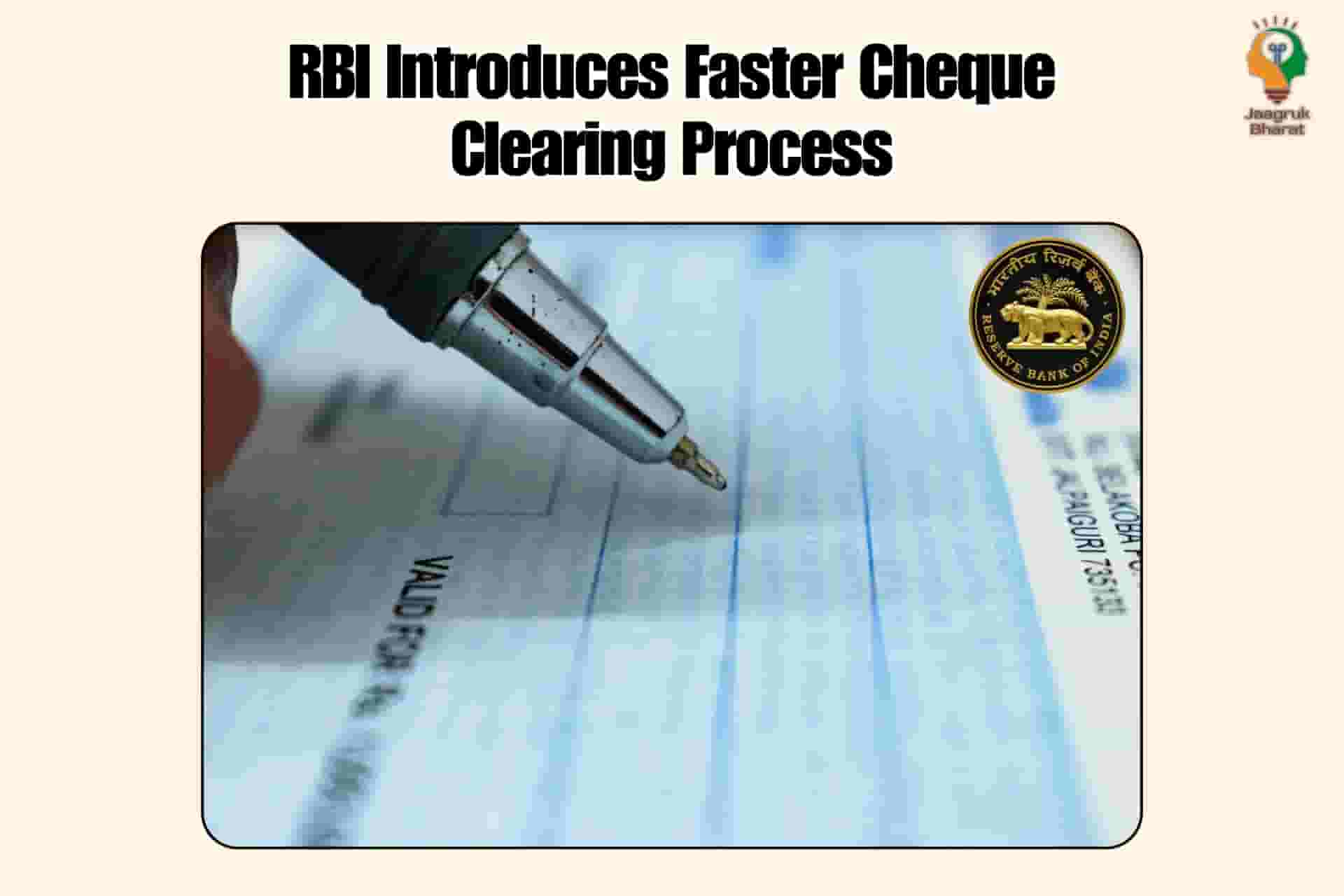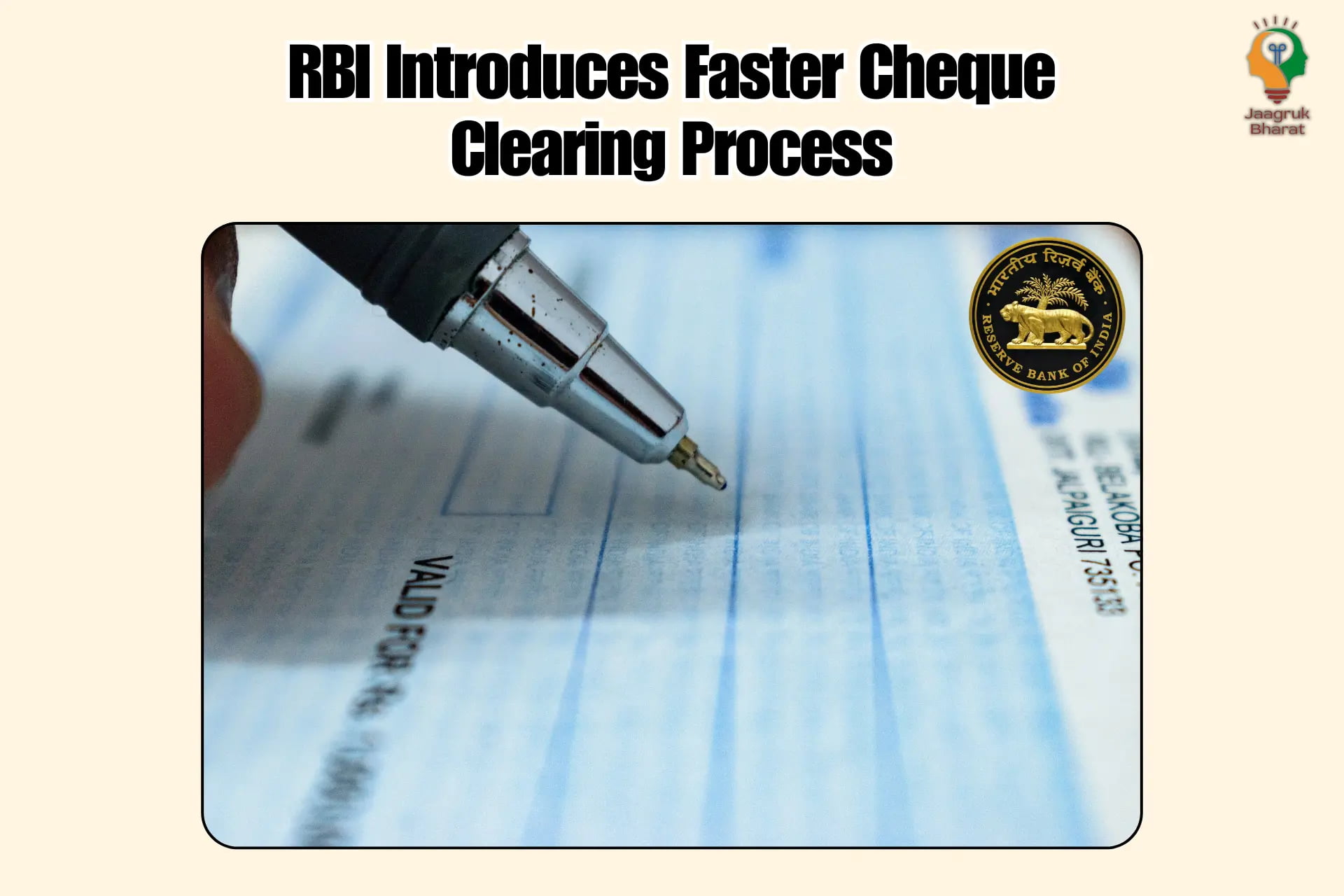RBI Introduces Faster Cheque Clearing Process: Closing In On NEFT And RTGS Speed
Updated: 21-01-2026 at 3:30 PM
3k


In a landmark move under RBI financial reforms, the Reserve Bank of India announced that cheques will now be cleared within a few hours instead of days. The RBI Governor formally unveiled this reform during the Monetary Policy Committee meeting on 8 August 2024, signalling a decisive step towards modernising legacy payment systems.
For decades, cheque-based payments remained a slower yet trusted pillar of India’s banking system. While digital platforms such as NEFT and RTGS transformed fund transfers, cheque clearance continued to take two to three working days, often disrupting cash flows for individuals and businesses alike.
This RBI banking news aligns cheque settlement speeds with digital payment benchmarks, marking a crucial milestone in RBI banking reforms 2026 and strengthening confidence in paper-based instruments even in a digital-first era.
Also Read: SEBI Launches Saarthi 2.0: Personal Finance App For Investors
Overview
Before diving into technical details, the table below offers a snapshot of what has changed, how it works, and why it matters for customers and banks alike.
| Aspect | Earlier System | New RBI Clearing System |
|---|---|---|
| Clearing Method | Batch processing | Continuous clearing |
| Clearing Time | 2–3 working days | Within a few hours |
| Technology Used | CTS (limited efficiency) | CTS + on-realisation-settlement |
| Physical Movement | Required earlier | Fully eliminated |
| Risk Exposure | Higher settlement risk | Significantly reduced |
| Customer Impact | Delayed fund access | Faster liquidity |
This RBI new clearing system aims to balance speed, security, and operational efficiency while retaining cheque relevance in India’s evolving payments ecosystem.
Understanding The Cheque Truncation System (CTS)
To understand how cheque clearing speeds have improved, it is essential to grasp the role of the Cheque Truncation System.
The Cheque Truncation System (CTS) is a technology-driven mechanism that eliminates the physical movement of cheques between banks. Instead of transporting the paper cheque, banks capture a high-quality electronic image and transmit it securely to the paying bank through the clearing house.
CTS-enabled cheques carry crucial details such as:
-
MICR band information.
-
Date of presentation.
-
Presenting bank details.
This digital transmission significantly reduces delays, costs, and logistical risks associated with physical handling.
Under the new RBI guidelines, CTS now operates with on-realisation-settlement, replacing traditional batch processing. This allows cheque scanning, verification, and settlement to occur continuously during banking hours, enabling faster cheque processing India has ever experienced before.
What Is Continuous Cheque Clearing and Why Does It Matter?
This section explains how continuous clearing reshapes cheque settlement and what readers can expect from this transition.
Earlier, banks processed cheques in fixed batches at designated times, creating unavoidable waiting periods. Continuous clearing removes this bottleneck by allowing cheques to enter the clearing cycle immediately after submission.
Key Features of Continuous Cheque Clearing:
-
Real-time or near real-time processing during business hours.
-
Reduced dependency on end-of-day batch settlements.
-
Faster confirmation of cheque realisation.
This transformation forms the backbone of the Cheque clearing time reduced initiative and strengthens overall banking efficiency reforms led by the RBI.
Also Read: Shakti Scheme Puts Strain on State Finances, But It Will Continue: Minister
Benefits Of Continuous Cheque Clearing in Banking
The shift to continuous clearing brings tangible advantages for both retail and institutional users. Below is a clear breakdown of how customers benefit from this reform.
1. Faster Access to Funds
Customers no longer need to wait several days for cheque proceeds. With cheques clearing within hours, liquidity improves significantly, mirroring digital payment convenience.
2. Reduced Settlement Risk
Shorter processing cycles reduce the window for settlement failures, making cheque transactions safer and more predictable.
3. Enhanced Customer Experience
Delayed cheque clearance has long been a source of dissatisfaction. The faster cheque clearing process directly addresses this pain point, improving trust in traditional banking instruments.
4. Operational Efficiency for Banks
Banks benefit from reduced physical handling, lower operational costs, and improved workflow automation, reinforcing long-term sustainability.
These advantages collectively strengthen the impact of RBI payment systems news on everyday banking.
Impact Of RBI's New Cheque Clearing Guidelines On Banking Customers
The RBI cheque clearing update carries particular significance for businesses, traders, and professionals who rely on cheques for large-value payments.
Faster clearance improves:
-
Working capital cycles.
-
Vendor payment timelines.
-
Cash flow predictability.
Small and medium enterprises, in particular, stand to gain from quicker fund availability without switching entirely to digital payment infrastructure. This balanced approach ensures financial inclusion while advancing modernisation.
Read More: New RBI Rule: Flexibility and Relief of Credit Card Users
Difference Between NEFT, RTGS, And Cheque Clearing Times
To help readers understand where cheque clearing now stands, the table below compares all three payment methods clearly.
| Payment Mode | Processing Speed | Transaction Nature | Availability |
|---|---|---|---|
| NEFT | Near real-time (30-min batches) | Electronic | 24×7 |
| RTGS | Real-time | High-value electronic transfers | 24×7 |
| Cheque Clearing (New) | Within a few hours | Paper-based via CTS | Business hours |
This NEFT RTGS speed comparison highlights how cheque clearing now competes closely with digital alternatives, reshaping the debate around cheque clearing vs NEFT RTGS.
What Is The Positive Pay System For Cheques And How Does It Prevent Fraud?
Speed alone is insufficient without robust security. To address fraud risks, the RBI supports the Positive Pay System (PPS), developed by NPCI.
Under PPS, cheque issuers submit key details such as:
-
Cheque number.
-
Date.
-
Payee name.
-
Amount.
Banks verify these details before honouring the cheque, ensuring authenticity.
Key PPS Thresholds:
-
Mandatory for cheques above ₹5,00,000.
-
Optional for cheques from ₹50,000 onwards.
By combining PPS with continuous clearing, the RBI ensures that faster processing does not compromise safety, reinforcing confidence in cheque-based transactions.
How To Ensure Your Cheque Clears Faster Under The New RBI Rules
For customers to enjoy faster cheque-clearing times, they should ensure;
-
All Accurate Information: Make sure all details on the cheque are properly indicated, such as date, amount, payee’s name, etc.
-
CTS-Enabled Cheques: Confirm that you are using CTS-enabled cheques as per the new guidelines, since these will lead to quicker processing of your cheques.
-
Enrol in Positive Pay: Registering in PPS would help in avoiding any delays associated with verification procedures, especially when high-value cheques are concerned, thereby reducing the chances of fraud happening.
These simple measures allow customers to experience the full advantage of faster cheque processing, which India is now adopting.
Also Read: Indexation Benefit On LTCG Back
Role of Clearing Houses in the New RBI Framework
Clearing houses play a pivotal role in executing this transformation. With upgraded digital infrastructure, clearing houses now process cheque images instantly and route them securely between banks.
Recent clearing house updates RBI has introduced include:
-
Improved image validation standards.
-
Faster reconciliation protocols.
-
Enhanced dispute resolution mechanisms.
These backend improvements ensure system-wide reliability and scalability.
Cheque Clearing as Part of RBI Banking Reforms 2026
This reform does not exist in isolation. It forms part of a broader roadmap under RBI banking reforms 2026, aimed at:
-
Harmonising paper-based and digital payment systems.
-
Reducing systemic risk.
-
Enhancing customer-centric banking.
By modernising cheque clearing, the RBI demonstrates that innovation does not mean abandoning legacy systems but upgrading them to contemporary standards.
Conclusion
The RBI’s decision to accelerate cheque clearing marks a decisive moment in India’s financial evolution. By integrating continuous clearing and on-realisation-settlement into the CTS framework, the central bank has ensured that cheque payments remain relevant, efficient, and secure.
This reform delivers faster access to funds, reduced settlement risk, and improved customer satisfaction while strengthening institutional efficiency. As part of broader RBI financial reforms, it reflects a pragmatic approach to modernisation—where speed, security, and inclusion coexist.
With cheques now approaching digital speeds, the future of India’s banking system looks not only faster but also more balanced and resilient.
Get the latest updates on government schemes and policies with Jaagruk Bharat. Join India's biggest Jaagruk Bharat community. Share your thoughts, questions, and favourite topics with us.
Frequently Asked Questions
0
0
3k
0
0
3k Views
0
No comments available





Our Company
Home
About
T&C
Privacy Policy
Eula
Disclaimer Policy
Code of Ethics
Contact Us
Careers
Cancellation & Refund Policy
Categories
Women
Insurance
Finance
Tax
Travel
Transport & Infrastructure
Food
Entertainment
Communication
Government ID Cards
E-commerce
Traffic guidelines
Miscellaneous
Housing and Sanitation
Sports
Startup
Environment and Safety
Education
Agriculture
Social cause
Employment
Disclaimer: Jaagruk Bharat is a private organization offering support for documentation and government scheme access. We are not affiliated with any government body. Official services are available on respective government portals. Our goal is to make processes easier and more accessible for citizens.
All Copyrights are reserved by Jaagruk Bharat